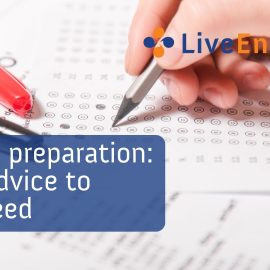
TOEIC officials are not allowed to give tips and suggestions to the public about the TOEIC exam but if they were, they may say something like this;
“I want to understand you”
This means that you need to speak clearly and at an appropriate speed. You need to know if you are difficult to understand because you speak too fast or if you speak so slowly that you have no intonation because you will lose points for that too.
This is where rehearsal and recording your voice comes in. Listen to yourself on playback and listen critically. If you have not recorded your voice at least one time, you have not prepared well enough.
“I want to hear your best English”
Don’t use slang. Don’t use informal or impolite language. There is a column on the marking sheet for intonation, pronunciation, grammar, vocabulary and content but not for coolness or wit. So save the slang for impressing your friends.
“Spice it up a bit”
Imagine your job is to listen to all of those recordings. If all of the candidates speak in boring monotonous voices, this is your opportunity to stand out with just a little intonation and varied pitch and volume. Try it out, changing the pitch, volume and ensuring that you use intonation in your speech will make your voice instantly more attractive to listeners.
“No more vanilla!”
Many students are taught to respond to how are you? with I’m fine. Little known secret here: if a native-English speaker gave me that response, I would think that they don’t want to speak with me. I would think that they are giving me the vanilla response because they have no interest in conversation with me.
Vanilla words are plain. They have no flavor. Words like good and fine and OK when we could be using terrific, fantastic or giving more detail. A good teacher could be a dedicated teacher, a good day could be a memorable day, and a good dessert could be mind-bending.
Markers want to hear the vocabulary that you have so no vanilla when you are recording your answer in TOEIC, break out the double chocolate delight and the passion fruit swirl.
“Practice like you mean it”
When you practice at home or with your English tutor, simulate real conditions which means that you should practice with the distraction of background noise. Turn on the TV and face the other direction to achieve this. Also, when you practice, do all of the things above. Don’t practice just the content, practice your voice, speed, intonation, vocabulary etc.







